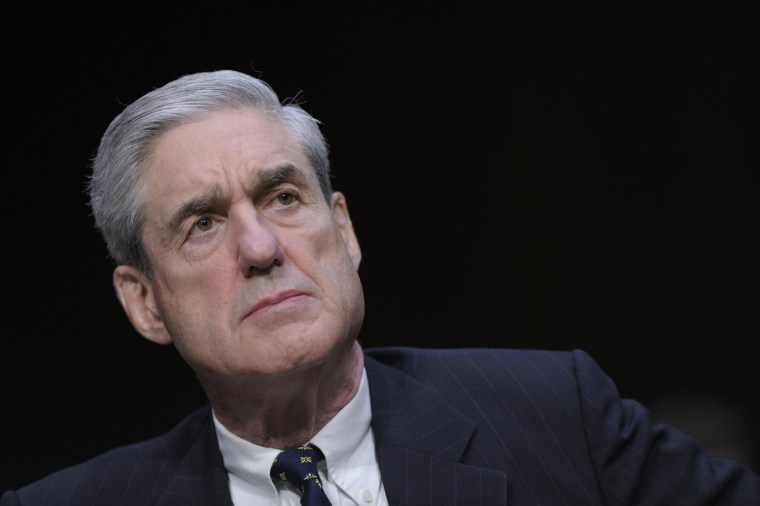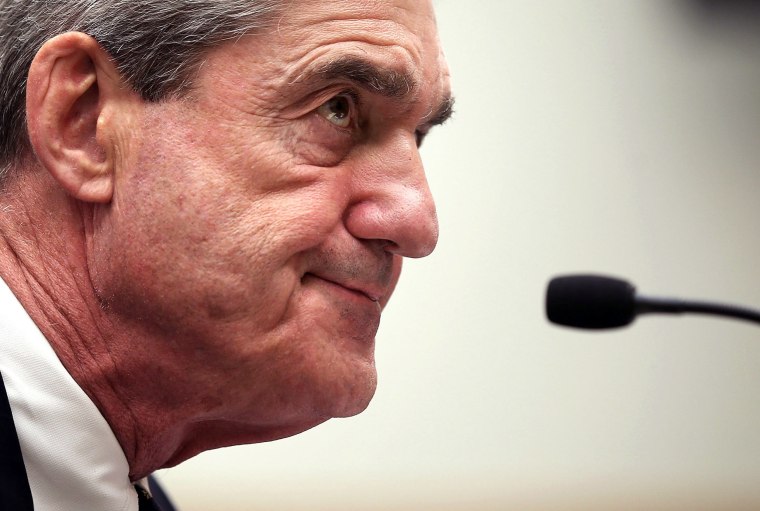President Donald Trump’s unusual pardon of former Arizona Sheriff Joe Arpaio, issued before his federal case was even finished, has sparked a debate over whether the president could end Special Counsel Robert Mueller's Russia probe with a spate of pre-emptive pardons.
But even mass pardons of all suspects in the Russia case would not close the door to potential prosecutions.
While presidential pardons can halt the federal case, local prosecutors could then pursue any Americans suspected of aiding Russia’s election meddling. In fact, legal experts say presidential pardons could make that prospect more likely.
According to a new MSNBC legal analysis, federal pardons could open the door to local criminal investigations in several states.
Why So Many States Might Have a Case
The most likely places are New York, Virginia and Illinois, three states where there is evidence that election-related crimes occurred — though it is unclear if any Americans assisted with those Russian efforts.
Beyond the three main states, the legal arguments for potential criminal jurisdiction are even broader, extending to many of the 39 states that were subject to Russian hacking.

According to U.S. intelligence and public accounts, Russian efforts included criminal hacking into Democratic National Committee emails, a conspiracy to distribute that stolen material, and separate computer intrusions into state election systems. That activity could form the basis of felony cases in several states, and conspiracy charges if any Americans were found to be involved.
Local prosecutors have not disclosed investigations of such conduct. Typically, state and local prosecutors defer to federal investigators, especially in national security cases. But pardons could change that.
According to a source with knowledge of one state attorney general’s preparations, the office is already studying its potential state jurisdiction for Russia-related crimes. The source told MSNBC that state investigators typically defer to federal inquiries, but there is a perception the Russia inquiry may not turn out to be a typical situation.
NBC News previously reported that Mueller tapped multiple grand juries to gather evidence in the ongoing federal inquiry into alleged links between Trump's presidential campaign and Russia, and that former campaign chairman Paul Manafort and former National Security Adviser Michael Flynn are under scrutiny by Mueller.
Trump has denied that he or any members of his team colluded with Russia during the 2016 presidential campaign, and Mueller's probe goes beyond the conduct of Trump and his advisers and includes the entire international hacking plot.
The breadth of that plot widens the net of criminal exposure.
According to legal scholars and former prosecutors surveyed by MSNBC, the case for local Russia prosecutions would be stronger if the federal case is prematurely shut down.
"If there were to be a pre-emptive pardon," says former New York Chief Deputy Attorney General Harlan Levy, local prosecutors "would look at the facts and law, and do the right thing and protect the rule of law the best they can."
"There’s absolutely a stronger local case if the federal case is shut down," says former Watergate prosecutor Nick Akerman.
Jed Shugerman, a historian and Fordham law professor, says the very nature of the Russian plot strengthens the case for local prosecution.
"Given how widespread these crimes were," Shugerman says, "there are lots of different avenues for jurisdiction, and New York is the easiest one."
P.S. Ruckman Jr., a pardon scholar and author of "Pardon Me, Mr. President," notes that a federal pardon does not give a potential defendant legal protection in state court.
"There is nothing about a federal pardon that prevents state offenses from being prosecuted," he said.
In a landmark 1959 case, the Supreme Court ruled states have the lawful authority to separately prosecute an individual regardless of what occurs in the federal system, and "even in the aftermath of federal acquittal."
Local Jurisdiction for Russian Crimes
While the U.S. government concluded Russia was behind criminal activity in the 2016 election, no government body has accused Americans of being involved.
Legal experts say prosecutors must follow evidence, and it is too early to conclude whether any Americans (or Trump associates) conspired with Russians to a criminal degree. If Americans were in on the plot, though, there could be jurisdiction to pursue them in the states.
"You would have to find that one of those [election] crimes occurred in New York," says Jennifer Rodgers, a former federal prosecutor in New York. "I don’t think that’s a huge stretch, given that Trump’s people are here — this is where he lived, and his inner-circle lived."
For jurisdiction, Rodgers says a prosecutor would need evidence that the planning or commission of a crime occurred in the state.
"If Donald Jr. meets with Russian lawyers," she says, "you could argue that the act was in furtherance of an underlying crime, and there is jurisdiction in New York."
Rodgers adds that while the federal probe continues, local prosecutors are taking a back seat. "I don’t think anyone is out there aggressively investigating this — they are not issuing subpoenas," she says.
Beyond New York, Virginia might be able to pursue anyone involved in the DNC hack, given that much of Washington's technical support is located there. Virginia law bars computer trespass and computer invasion of privacy, and it has a felony conspiracy law targeting "any person" who conspires to commit a felony in the Commonwealth.
Illinois is one of the few states that has been publicly identified as a victim of Russian hacking. Its state law bars computer fraud and tampering, and criminalizes aiding and abetting such crimes.
Experts say the legal case against the hackers working for Russia may be solid — but that is irrelevant if the defendants cannot be identified or apprehended.
For example, Illinois Attorney General Lisa Madigan might have a case, but no defendants.
"Russians aren’t going to come into her court," says former Maine Attorney General Jim Tierney.
That has not always stopped prosecutors. The DOJ has indicted Chinese and Russian hackers for attacks on American companies, even though they are fugitives abroad.
Prosecuting agents of a foreign power, however, is different than making a potential case against agents of the United States.
"It could happen," Tierney says. "If the [district attorney] of Baltimore wants to go after the president, is that destabilizing? Yes it is."
Tierney, who now teaches about the role of state attorneys general at Harvard Law School, adds, "The actual legal and practical obstacles to bringing this kind of case are very high."
On the federal level, the Justice Department holds the view that it cannot indict a sitting president. (The idea is that only Congress can charge and remove a president, through House impeachment and Senate trial). At the local level, prosecutors do not generally patrol federal government officials on their government service — and certainly not the president.
That line does not preclude prosecution of other individuals who happened to work for the president. Experts say the entire issue is murky.
"This is kind of uncharted territory," says Rodgers, the former federal prosecutor.
Feds Go First, Except When They Don't
Apart from any pardons or interference with Mueller, the typical state deference to federal investigations is a tradition, not a rule.
In 2003, Oklahoma’s Attorney General, W.A. Drew Edmondson, jumped ahead of a major federal investigation, indicting several former Worldcom executives on state securities charges before DOJ could act.
Edmondson says he alerted the lead federal prosecutor, then-U.S. Attorney James Comey, but decided to act because the federal inquiry dragged on with no indictments. The move broke with tradition, but was lawful.
Federal court rules also provide a formal mechanism for state prosecutors to pick up where federal investigations end.
Under the U.S. Federal Rules of Criminal Procedure, federal grand jury materials, which are secret, may be requested by local prosecutors if the evidence shows a "violation of state law."
If the special counsel probe ended prematurely, local prosecutors could request that material, from interviews with every witness Mueller brings before the grand jury to other secret evidence it reviewed.
If Mueller or his investigators were no longer working for the Justice Department, states could also consider hiring them as special prosecutors or investigators to work the state case.
Double Jeopardy
According to an MSNBC review of state laws, the timing of any potential Trump pardons could be a key factor in potential state investigations.
That is because state laws protecting people from double jeopardy — being tried twice for the "same crime" — kick in at specific points during a federal prosecution.
In several states, if Trump pardoned people pre-emptively, before federal prosecution, it would be easier for the states to pursue prosecutions. The double jeopardy protection would not be triggered, because the pardons came before any federal prosecution.
By contrast, if Trump waited until later in a federal prosecution, and then pardoned defendants, they might be protected from state prosecution for the same conduct.
For example, Virginia bars state prosecutions for acts that already faced "prosecution under the federal statute." So people pardoned after facing federal charges for election hacking could argue they were facing the same charges if pursued for hacking under Virginia law.
New York also bars state prosecutions for acts that already faced federal "prosecution," though there is an exception for criminal conspiracies involving another state to commit a crime in New York.
The details vary by state, and have not been tested in a case like the Russia probe. The legal landscape suggests, however, that an early or impulsive set of pardons by Trump might make state prosecutions easier, while pardons issued late in a federal prosecution could prevent prosecutions for the same underlying conduct in many states. (Complicating matters further, most of the 39 states subject to election hacking have not been publicly identified, and the analysis depends on their respective double jeopardy laws.)
Ultimately, the president’s federal pardon power is absolute. As Trump’s legal defenders emphasize, there is clear precedent for issuing presidential pardons, even long before a criminal trial and for the president’s own staff.
The Supreme Court has long held federal pardons may be issued at "any time," a precedent that dates to the 19th century. President George H.W. Bush demonstrated the breadth of that power with his controversial pardons for six former Reagan-Bush officials, who were charged with Iran-Contra crimes by the independent counsel in 1992. The move included a full pardon for former Defense Secretary Caspar Weinberger — just 10 days before his trial was set to begin. Weinberger was charged with making false statements to the federal government, a federal offense.
The Russia probe may be different in one important respect: Unlike lying to Congress, the underlying actions may qualify as both federal and state crimes.
Legal experts agree that effective prosecutions of such crimes are far more likely to prevail at the federal level, but if that door is closed by pardons, another door may remain ajar.

